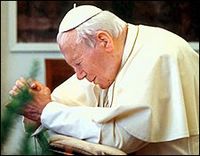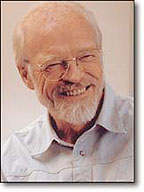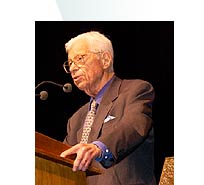
Terri Shiavo 1963-2005

Earlier in 2004, Mel Gibson’s film The Passion of the Christ was touted by many Christians as “the greatest outreach opportunity in 2000 years.” I have not seen the film, but I imagine it is stunning and powerful, and I hope God will use it in unprecedented ways. But I find this assumption of many Christians disgusting.
What is needed is not the showing of a movie (no matter how great), but a revolution of Christians who are showing the love of Christ by moving into the world and loving their neighbors. In other words, unless disciples are following the Great Commandment, it is fruitless to engage in the Great Commission. If we replicate people who do not love God or their neighbors, we are not fulfilling the mission of Jesus.
I clearly remember hearing a pastor say something to the effect of "the greatest outreach opportunity" when Mel Gibson's movie came out - and I thought to myself, "Oh Please!" Why can't we (me included) rather work toward building a transformed life where people see Jesus in ME, as opposed to up on a screen while eating popcorn, or God forbid, on Christian TV! May it be so, may I love people uncommonly, make I care uniquely, may I love beyond my means.
And McClaren goes on to suggest that "the concept of church may be abused beyond recovery". The Church Lady would not be happy with THAT concept, for heaven's sake!
Hey people, want to "otherwise imagine" the church along with me? How about we begin to question our old, safe, warm and fuzzy models of following Jesus, and begin to take some risks? How about we religious introverts begin working on becoming extroverts? In the imortal words of Bluto in Animal House, "whooooos with me.....arrrrrhhhhhhhhh!

"I do not understand why people who want to save the whales (so do I) find campaigns to save humans so much less arresting. I do not understand their lack of passion. But the save-the-whales people are somehow rarely the stop-abortion-please people.
The PETA people, who say they are committed to ending cruelty to animals, seem disinterested in the fact of late-term abortion, which is a cruel procedure performed on a human.
I do not understand why the don't-drill-in-Alaska-and-destroy-its-prime-beauty people do not join forces with the don't-end-a-life-that-holds-within-it-beauty people."



It seems to me the Pope gets it. Much about this life is learning how to die, in so many ways. And so, Pope John Paul looks to us to be "out of it", infirm. We don't like this, it is not cool, it makes us uncomfortable. And perhaps, it is in these places where God dwells.A few days ago in Rome, when I asked Nigerian Cardinal Francis Arinze what this phase of the remarkable pontificate of John Paul II meant, the cardinal suggested that, from his hospital bed, the pope was putting some serious questions on the world's agenda -- does suffering mean anything, or is it simply an absurdity? Does the suffering contribute anything to the rest of us? Is there dignity in old age?
In Cardinal Arinze's mind, the example of John Paul II offered an answer to those questions. Yes, suffering can have meaning. Yes, that suffering can teach the rest of us: It reminds us that we cannot control our lives, and it elicits a compassion that ennobles us. Moreover, the cardinal suggested, John Paul II, in his weakness and suffering, was a tremendous encouragement to the elderly, the sick, the disabled and the dying, who find strength and hope in his example.
The world has missed a lot of Karol Wojtyla's story in his 26 years as pope, because the world tries to understand him in political terms, as another power player on the global stage. There's no doubt that John Paul II has been the most politically influential pope in centuries. But that is not who he is, or what he's about, at his deepest level. His two recent hospitalizations and his unembarrassed struggle to live out the commitment to service that he made at his election in 1978 should remind everyone that this man is, first and foremost, a Christian pastor who is going to challenge us with the message of the cross -- the message of Good Friday and Easter -- until the end.
As Hanna Suchocka, the former Polish prime minister, described the pope to me recently, "He is living his via crucis," his way of the cross. It's not something the world has watched a pope do for a very long time. We should recognize it for what it is, and be grateful for the example.

This is a tragedy. Congress has responded by rushing to pass a law that will allow her case, but only her case, to be heard in federal court. But there is no guarantee that, if it is heard there, a federal judge will do any better than the Florida one. What is lacking in this matter is not the correct set of jurisdictional rules but a decent set of moral imperatives.
That moral imperative should be that medical care cannot be withheld from a person who is not brain dead and who is not at risk for dying from an untreatable
disease in the near future. To do otherwise makes us recall Nazi Germany where retarded people and those with serious disabilities were "euthanized" (that is, killed). We hear around the country echoes of this view in the demands that
doctors be allowed to participate, as they do in Oregon, in physician-assisted
suicide, whereby doctors can end the life of patients who request death and have
less than six months to live. This policy endorses the right of a person to end
his or her life with medical help. It is justified by the alleged success of this policy in the Netherlands. But it has not been a success in the Netherlands. In that country there have been well over 1,000 doctor-induced deaths among patients who had not requested death, and in a large fraction of those cases the patients were sufficiently competent to have made the request had they wished.Keeping people alive is the goal of medicine. We can only modify that policy in the case of patients for whom death is imminent and where all competent family members believe that nothing can be gained by extending life for a few more days. This is clearly not the case with Terri Schiavo. Indeed, her death by starvation may take weeks. Meanwhile, her parents are pleading for her life.


I am thankful for the swirl of Milky Way in my own girls. I am also thankful for the swirl of remarkable, amazingly unique folks tonight in that home - all there for love of the Kingdom, and the King, who persistently, relentlessly, makes lives new."I know where he got his gallows humor. I can see myself so clearly in him, many of my worst traits, some of my goodness. I can also still see many of Sam's ages in him: New parents always grieve as their babies get bigger, because they cannot imagine the child will ever be so heartbreakingly cute and needy again. But Sam is a swirl of every age he's ever been, and all the new ones, like cotton candy, like the Milky Way."

In church last Sunday, there was a couple in front of us with two bratty kids. Two pews behind us there was another couple with their two bratty kids making a lot of noise. This is mostly an older congregation. So these people are set in their ways. Their kids have been gone a long time. And so it wasn't a very nice service; it was just not very good worship. But afterwards I saw half a dozen of these elderly people come up and put their arms around the mother, touch the kids, sympathize with her. They could have been irritated.
Now why do people go to a church like that when they can go to a church that has a nursery, is air conditioned, and all the rest? Well, because they're Lutherans. They don't mind being miserable! Norwegian Lutherans! And this same church recently welcomed a young woman with a baby and a three-year-old boy. The children were baptized a few weeks ago. But there was no man with her. She's never married; each of the kids has a different father. She shows up at church and wants her children baptized. She's a Christian and wants to follow in the Christian way. So a couple from the church acted as godparents. Now there are three or four couples in the church who every Sunday try to get together with her. Now, where is the "joy" in that church? These are dour Norwegians! But there's a lot of joy. There's an abundant life going, but it's not abundant in the way a non-Christian would think. I think there's a lot more going on in churches like this; they're just totally anticultural. They're full of joy and faithfulness and obedience and care. But you sure wouldn't know it by reading the literature of church growth, would you?
I have a good friend who is in seminary studying for a call to the pastorate. As a part of this process, she has taken a class on Pastoral Care and Counseling; and a requirement of the class is that everyone attend at lease one AA meeting. At the meeting, there was a discussion about the concept of a "Higher Power", which is a mainstay of AA practice.
Attendees were discussing why it is that AA uses the concept of "a Power greater than ourselves", and this discussion had lead to a conversation about God. From this conversation came a number of comments about pain inflicted upon AA folks by people in the church. Judgment, isolation, awkwardness, and a lack of compassion. All from us in the church. Church. That's us, people; me, and you. Causing pain, not loving like Jesus (who hung out with some rather nasty types on occassion) for those most in need of healing. We can be a pretty awkward and judgemental bunch, can we not?
Maybe we need to hang out with some rather dull Lutherans. I believe their church is somewhere in Montana.
A universally acceptable Christian emblem would obviously need to speak of Jesus Christ, but there was a wide range of possibilities. Christians might have chosen the crib or manger in which the baby Jesus was laid, or the carpenter's bench at which he worked as a young man in Nazareth, dignifying manual labour, or the boat from which he taught the crowds in Galilee, or the apron he wore when washing the apostles' feet, which would have spoken of his spirit of humble service. Then there was the stone which, having been rolled from the mouth of Joseph's tomb, would have proclaimed his resurrection. Other possibilities were the throne, symbol of divine sovereignty, which John in his vision of heaven saw that Jesus was sharing, or the dove, symbol of the Holy Spirit sent from heaven on the day of Pentecost. Any of these seven symbols would have been suitable as a pointer to some aspect of the ministry of the Lord. But instead the chosen symbol came to be a simple cross. Its two bars were already a cosmic symbol from remote antiquity of the axis between heaven and earth. But its choice by Christians had a more specific explanation. They wished to commemorate as central to their understanding of Jesus neither his birth nor his youth, neither his teaching nor his service, neither his resurrection nor his reign, nor his gift of the Spirit, but his death, his crucifixion.

I don't want to suggest that those of us who are following Jesus don't have any fun, that there's no joy, no exuberance, no ecstasy. They're just not what the consumer thinks they are. When we advertise the gospel in terms of the world's values, we lie to people. We lie to them, because this is a new life. It involves following Jesus. It involves the Cross. It involves death, an acceptable sacrifice. We give up our lives.
The Gospel of Mark is so graphic this way. The first half of the Gospel is Jesus showing people how to live. He's healing everybody. Then right in the middle, he shifts. He starts showing people how to die: "Now that you've got a life, I'm going to show you how to give it up." That's the whole spiritual life. It's learning how to die. And as you learn how to die, you start losing all your illusions, and you start being capable now of true intimacy and love. It involves a kind of learned passivity, so that our primary mode of relationship is receiving, submitting, instead of giving and getting and doing. We don't do that very well. We're trained to be assertive, to get, to apply, or to consume and to perform.
Its learning how to die. Oh my. As I have passed my mid-40s, and have two parents now in their mid-80s, as well as a dear friend battling cancer, I tend to think about the fleeting nature of life more than I used to. So, it really is about learning to die, isn't it? When one accepts Jesus as Lord, there is a real sense of submitting control of life to Another, a letting go (dying to self). As one becomes a disciple, there are new learned behaviors, and letting God have more of the "bad parts" of ourselves (in my case anger and selfishness); another form of dying. Death and dying found in the midst of new life in Christ.
Giving up our lives. Now won't that make a slick "come to church" brochure. "Come to the First Church of Happy Valley (where all the Happy, Handsome, Well Dressed, Normal, Disease Free, Clean and Thrifty People Come!) and learn how to....DIE!? But then, that is what Jesus is calling us to, in many ways, is it not? Much to think about here, in the thoughts of Eugene. Perhaps we can reason together....
Final thought. Go out today, and buy this book. This is the meatier text behind the interview with Eugene Peterson, and will give us all plenty to think about for months to come! I bought my copy today.

The Christian life is not a wonderful life - in the way we want it to be. Oh my goodness, that single comment right there, in my mind takes out about 1/2 of the stuff I see on the bookshelves in Christian Book stores (including this book, which merely by its title, gives me massive willies). Maybe that is why, when I seldom visit my local Christian book store, I get a feeling like I have been dipped in Sweet N' Low; all sugar, no calories, no protein, no carbs, no real nourishment for the soul. A kind of parroting of all the nice neat parts of American culture, without cuss words, and lots of Thomas Kinkade art.We've got to disabuse people of these illusions of what the Christian life is. It's a wonderful life, but it's not wonderful in the way a lot of people want it to be.
If intimacy means being open and honest and authentic, so I don't have veils, or I don't have to be defensive or in denial of who I am, that's wonderful. But in our culture, intimacy usually has sexual connotations, with some kind of completion. So I want intimacy because I want more out of life. Very seldom does it have the sense of sacrifice or giving or being vulnerable. Those are two different ways of being intimate. And in our American vocabulary intimacy usually has to do with getting something from the other. That just screws the whole thing up. It's very dangerous to use the language of the culture to interpret the gospel. Our vocabulary has to be chastened and tested by revelation, by the Scriptures. We've got a pretty good vocabulary and syntax, and we'd better start paying attention to it because the way we grab words here and there to appeal to unbelievers is not very good.
Darn that Jesus. He is not self-actualized. Not listening to his inner child! How do we communicate this to a waiting world. This stuff is not easy. But our silly Christian culture makes out like it is.
One more quote from Eugene, that speaks for itself:
I've been a pastor most of my life, for some 45 years. I love doing this. But to tell you the truth, the people who give me the most distress are those who come asking, "Pastor, how can I be spiritual?" Forget about being spiritual. How about loving your husband? Now that's a good place to start. But that's not what they're interested in. How about learning to love your kids, accept them the way they are?
My name shouldn't even be connected with spirituality.
Eugene, your views on the "s word" are not so bad after all.
May I love my wife, my kids, my friends, my neighbors all in a most unusual way, and may that love be seen as something of value for the Kingdom. May it be so Lord.

Spirituality is no different from what we've been doing for two thousand years just by going to church and receiving the sacraments, being baptized, learning to pray, and reading Scriptures rightly. It's just ordinary stuff. This promise of intimacy is both right and wrong. There is an intimacy with God, but it's like any other intimacy; it's part of the fabric of your life. In marriage you don't feel intimate most of the time. Nor with a friend. Intimacy isn't primarily a mystical emotion. It's a way of life, a life of openness, honesty, a certain transparency.Hearing this, for me, is like opening a window to a fresh spring breeze, after that drunk uncle has been visiting after eating a bad burrito.
If you read the saints, they're pretty ordinary people. There are moments of rapture and ecstasy, but once every 10 years. And even then it's a surprise to them. They didn't do anything. We've got to disabuse people of these illusions of what the Christian life is. It's a wonderful life, but it's not wonderful in the way a lot of people want it to be.
Not wonderful in the way we want it to be? What could that mean. More later, its late. Work tomorrow.





So, what should us church folk DO about this? Pretend like these people don't exist? Work hard to understand what their needs are, and why church is completely irrelevant to them? Care for them, start conversations with them about what they really want from life? Is their indifference about church our problem, do we "own" this one?
Or do we attribute their lack of attendance or interest in church to, well, their sinfulness? Their laziness? I mean heck, they can't get out of bed for a couple hours on Sunday? What is wrong with these people? Why would they want to go hear a potentially irrelevant sermon delivered in a place that looks like 1970 occurred yesterday and mingle with a group of indifferent Christian folk who like like they would also rather be at home, in bed, reading the Sunday paper?
"Its Over"
I had lunch yesterday with a pastor friend. He has always been known as a bit of a nonconformist, not really fitting in well with the crowd. He said to me, over sandwiches, "you know, the church as we know it, is a dying breed. Its over."
The more I have thought about this, the more encouraged I become. Perhaps God is doing a new thing? And perhaps those of us who Believe will be called to something really new, and different, much more like the First Century Church, or Revelations calls us to be. Who knows?
Thoughts, comments, questions?
